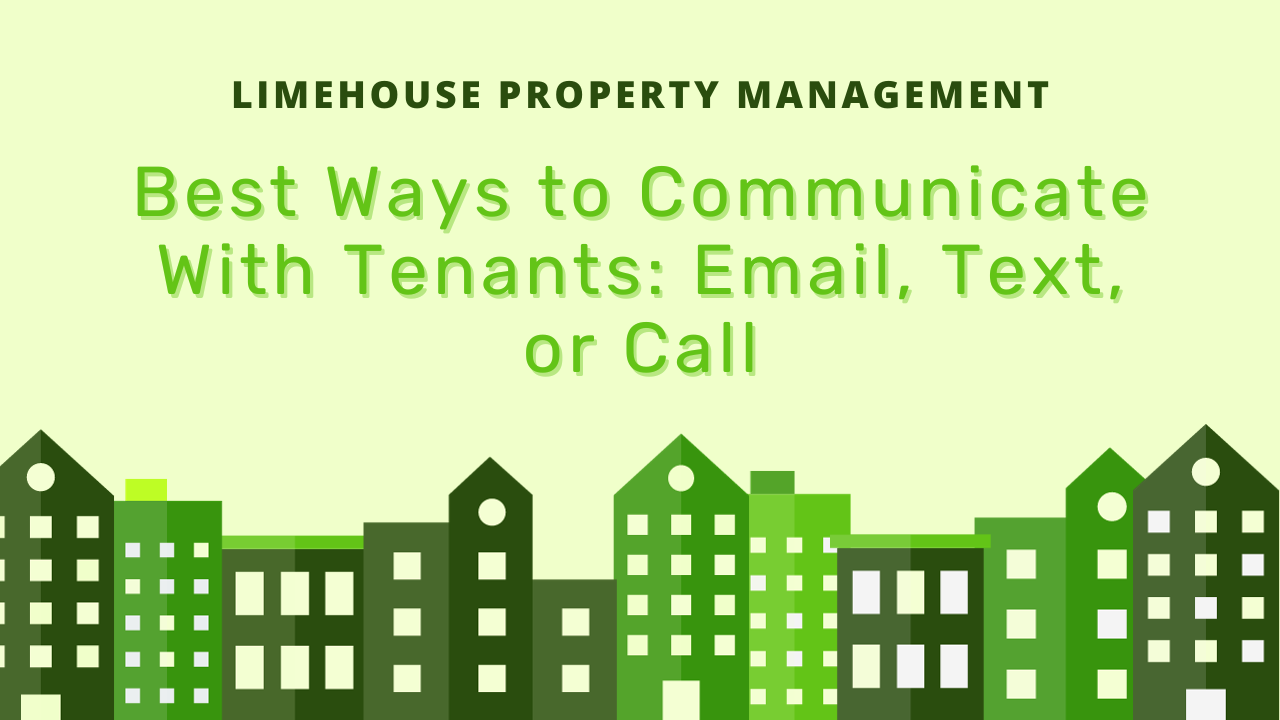Best Ways to Communicate With Tenants: Email, Text, or Call

With the convenience technology provides, landlords can reach out to their tenants anytime. The options for communication also lead to plenty of confusion over which tool to use for the best communication.
Should you email, text, or call your tenants? When is the best time to use each communication method? If you have ever debated which tool is appropriate to reach out to a tenant, read through our article to provide you with a reliable guideline.
Each communication tool carries its advantages and it is best to learn what to use for certain scenarios. This leads to happy tenants and retention.
When Should You Call Tenants
In the course of managing your rental space, you are bound to converse with your tenants in real-time. It is best to call tenants during the following situations:
- Emergencies: When an emergency occurs, you need to make sure that you give the proper instructions and guidance to the tenants. This entails a call since you want to relay the information fast.
- Courtesy Reminders: It is normal for landlords to send notices for payments and violations. While some can be automated, you can limit late payments or a violation of the property policies by calling the tenant. Some might be too busy and fail to notice that the rental dues are not paid yet.

- Information Gathering: When a topic of discussion is crucial, it is best to communicate with tenants directly. Sending a text or email can be impersonal and require a lot of back and forth. You can save more time, clarify matters, and learn more details by calling your tenants.
Best Practices for Calling Tenants
Speaking to a person through the phone is common, but with the plethora of options available, calling can sometimes be inefficient as a tool. You can end up with missed calls and voicemails.
If you opt to call your tenants, observe phone etiquette and try these tips:
- Professional Attitude: Be direct when calling a tenant. Say your name and the reason you’re calling. You want to save everyone’s time. Some can have a busy schedule or may not be in the mood for chitchat. It’s best to focus on the topic at hand..
- Detailed Voicemail: Avoid being vague and state your purpose at the outset. If not, tenants may not prioritize calling you back since there’s no reason provided that can reveal the urgency of the matter.
- Personability: Although tenants will not see your facial expressions, the tone you use can be felt. Provide friendly customer service over the phone and give a warm and polite greeting.

- Keep Within Business Hours: When it’s not an emergency, avoid calling your tenants outside of the normal working hours. When speaking with them, make sure the reason you’re calling is related to business. You want to honor your tenants’ privacy and they have a right to quiet enjoyment as a resident of your rental property.
When to Email Tenants
Emails are often used to share essential information or get details from your tenants but its important to still adhere to email etiquette. You can use this tool for
- Images: Since photo files can be large, it is best to share them over email.
- Reminders: With plenty of automated software tools that landlords can access for tenant reminders, you can streamline this process. Tenants can receive invoices that contain due dates and rental amounts, overdue reminders, and extra fees through email.
- Quick Information: If you are managing more than one property, you need to provide information efficiently and emails can be a good tool since you can send messages in bulk.
- Storing Information: Tracing information is easy with emails since time and date stamps are available. This can be vital, especially for presenting proof in a dispute.
Best Practices For Emailing Tenants
Landlords should be professional when sending emails and need to review the message before sending. They should
- Avoid sending a vague and incomplete message
- Ensure that the email has a purpose

- Add their contact information
- Attach the right file when sending attachments
- Ensure that emails are sent within normal working hours
Why Texting Tenants Is Effective
- Tenants can instantly receive the message, unlike emails which can be redirected to the spam folder.
- Wifi is not required to receive a text message, so they can be promptly read by the recipient.
- The response time can be quick since texting is convenient rather than emailing.
Best Practices For Texting Tenants
- Request permission from the tenants if text messaging works for them as an option to share and receive information. It is best to get written approval and include this in the lease agreement if the tenant is open to receiving text messages to reduce conflicts in the future.
- Tell the tenants the frequency of the text messaging and the topics you will share. This lets them know ahead of time what messages they will encounter. Be sure to keep the reasons business-related and text the tenants about repair updates, rental payment reminders, and property inspection schedules.

- Guide tenants on what messages they can send over text. If you have a dedicated tenant portal, then they no longer need to message you repeatedly for an issue.
Bottom Line
Choosing between the various communication tools can depend on why the landlord needs to contact the tenant. You also need to analyze your demographic well. If you have student residents, then they would likely prefer to receive information over text. Still, individuals can have different preferences, so it is best to always ask your tenants.
Are you seeking a trusted property manager to oversee your property? If yes, contact Limehouse Property Management today!
